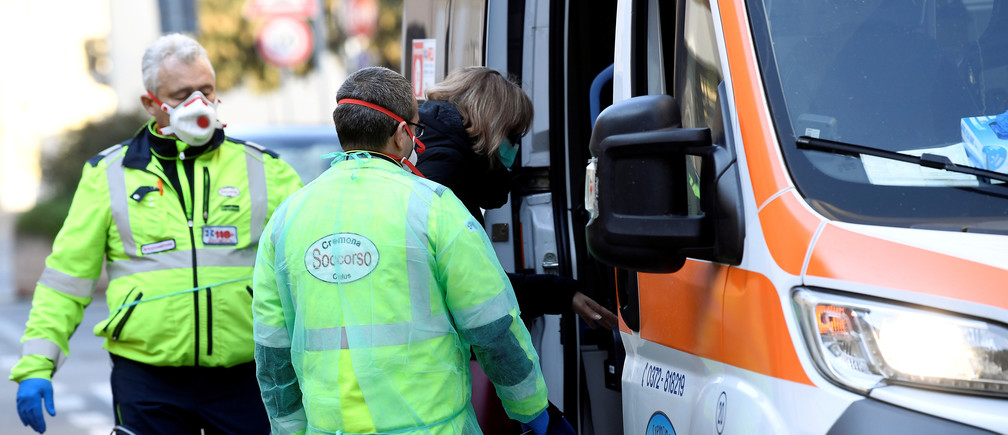This is what life is like inside Italy's coronavirus quarantine zone

Around 50,000 people life in affected regions. Image: REUTERS/Flavio Lo Scalzo

Explore and monitor how COVID-19 is affecting economies, industries and global issues

Get involved with our crowdsourced digital platform to deliver impact at scale
Stay up to date:
COVID-19
- Around 50,000 people are impacted by a quarantine zone in northern Italy.
- Italy is dealing with Europe's worst outbreak of the coronavirus.
- One primary school teacher has created a WhatsApp group to stay in touch with students.
Primary school teacher Marzio Toniolo would usually spend his weekday mornings cycling to work and teaching children in the small, quiet northern Italian town of San Fiorano.
Now, he is one of around 50,000 people whose lives are on hold after they were placed under quarantine as Italy tries to contain Europe’s worst outbreak of coronavirus that flared up in the regions of Lombardy and Veneto.
Shops are shut, the bar is closed and people speak to each other from a safe distance.
“We told my grandpa 100 times that the bar is not open because of the Spanish flu, to make him understand,” Toniolo told Reuters, referring to the deadly disease that killed millions after World War One and remains a byword for pandemics.
“He is very angry and very old,” he added.
San Fiorano is some 70 km (44 miles) from Italy’s financial capital Milan, and has effectively been closed off from the outside world along with nine neighboring towns that were the epicenter of the coronavirus outbreak.
Toniolo lives with his grandparents, who are both in their 80s, his wife Chiara Zuddas and their two-year-old daughter.
“We can take walks, we can walk our dogs, we can go jogging, we can ride bikes, but the authorities have suggested that we should avoid contact with other people,” he said.
Police blocks were put at the entrance to the town and anyone who tries to escape the blockade faces up to three months in prison or a fine of up to 206 euros ($223).
Zuddas is a primary school teacher too and she has created a WhatsApp group to keep in touch with her students.
“Even if they are very young, I understood that they needed to hear from us and we needed to hear from them. I didn’t do this to carry on with the school program, but to maintain human contact,” she said.

“Next Wednesday, I am going to do an English exam via WhatsApp,” she added.
The family regularly tests their temperature with a thermometer to make sure none of them are falling ill, and they are counting down the days to when the 2-week quarantine expires.
“We know that we may be infected and that we may already have contracted the coronavirus,” said Toniolo, adding that they were watching 24-hour television news stations to stay informed of what was going on.
“Let’s hope everything will be fine. I have friends who have contracted the coronavirus these days, but they already feel better,” he said. “They told me not to worry.”
Don't miss any update on this topic
Create a free account and access your personalized content collection with our latest publications and analyses.
License and Republishing
World Economic Forum articles may be republished in accordance with the Creative Commons Attribution-NonCommercial-NoDerivatives 4.0 International Public License, and in accordance with our Terms of Use.
The views expressed in this article are those of the author alone and not the World Economic Forum.
Related topics:
The Agenda Weekly
A weekly update of the most important issues driving the global agenda
You can unsubscribe at any time using the link in our emails. For more details, review our privacy policy.
More on Health and Healthcare SystemsSee all
Johnny Wood
May 1, 2024
Prakash Tyagi
May 1, 2024
Katherine Klemperer and Anthony McDonnell
April 25, 2024
Vincenzo Ventricelli
April 25, 2024
Shyam Bishen
April 24, 2024






